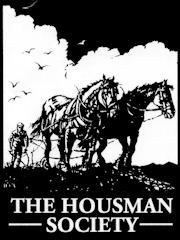A Shropshire Lad
|
Key: V: Textual Variation. C: Commentary. Q: Question. Glossary
ASL XXVII “Is my team ploughing”
Top ▲ Glossary
| Line | Word | Glossary |
| 26 | pine | As an intransitive verb: 1. To long for somebody or something, especially somebody or something unattainable 2. To become weak and lose vitality as a result of grief or longing But consider that pine is one wood traditionally used in the manufacture of coffins |
Top ▲ Commentary
| Line | Commentary |
| Date: May – July 1895 (1st draft), 10 Aug – 30 Sept 1895 (2nd draft) | |
| 11 | “leather” ie the football |
| 1, 9, 17, 25 | Note that the voice of the dead lover begins each question in the same way; the first lines of these stanzas are irregular, both in terms of the number of syllables and the rhythm |
| meter | Four line stanzas, mainly of six syllables (iambic trimeter), although the first lines of a number of stanzas are irregular, both in terms of the number of syllables and the rhythm |
Top ▲ Variations
| Line | Text | Textual variation |
| Title | D1 | No title |
| 1 | D1 | my] \ <the> / |
| 10 | D2 | Along] <Beside> \ <Against> / |
| 17 | D1 | girl happy] <love contented> |
| 18 | D1 | thought hard] <was sad> |
| 19 | D1 | And lies she down \ is her heart / contented → And do her tears fall fewer |
| 19 | D2d1 | <And has she ceased from crying> \ And [ ? ] >/ |
| 19 | D2d2 | → <And turns she soon to slumber> \ And does she weep \ cry / no longer |
| 19 | D2d3 | \ And has she <ceased her crying> \ tired of weeping / |
| 20 | D1 | <Late \ <Wept> / in the fading eve?> → <At to-shut of the eve?> |
| 20 | D1d2 | <At to fall of the eve> |
| 20 | D2d2 | <When> \ As / she lies down at eve? |
| 21 | D2 | Ay, <<her> heart [ ? ] \ <tears are fewer> / \ she lies down lightly, / grief’s forgotten,> |
| 22 | D1 | <Be sure> <s> She does not \ think to / weep → She turns no more \ seldom thinks / to weep; \ She’s long left off to weep / |
| 22 | D2 | <She lies not down to weep;> \ She lies not down to weep;/ → <She does not wake to weep> \ She [?does not] wake to weep / |
| 24 | D1 | Be] Lie |
| 26 | D1 | <To see the daylight shine> → Now I am thin and pine |
| 27 | D1 | And has] <[H]as> \ [A]nd / has |
| 29 | D1 | lie] |
| 30 | D1 | lie] sleep |
Top ▲ Questions
| Line | Question |
| 1, 9, 17, 25 | What is the effect of the fact that the first lines of these stanzas are irregular, both in terms of the number of syllables and the rhythm? |
| 19-22 | Using the notes on the textual variations of these lines, reconstruct the various versions and consider the merits of each. In what ways is the final version superior? |
| 21 | What do you understand by the poet’s use of the word “lightly“? |
| 29 | Why does this final reply begin with a different word from all the others? How is the hesitancy in his answer demonstrated through the structure of the stanza |
| 29-30 | In both these lines, the poet changes “sleep” in the drafts to “lie” in the final version. What is the effect of a) the word change and b) the repetition? |
| 32 | Explore the humour of this poem. |
